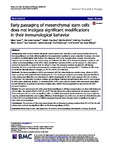Early passaging of mesenchymal stem cells does not instigate significant modifications in their immunological behavior
| dc.contributor.author | Sareen, N | |
| dc.contributor.author | Sequiera, GL | |
| dc.contributor.author | Chaudhary, R | |
| dc.contributor.author | Abu-El-Rub, E | |
| dc.contributor.author | Chowdhury, SR | |
| dc.contributor.author | Sharma, Vikram | |
| dc.contributor.author | Surendran, A | |
| dc.contributor.author | Moudgil, M | |
| dc.contributor.author | Fernyhough, P | |
| dc.contributor.author | Ravandi, A | |
| dc.contributor.author | Dhingra, S | |
| dc.date.accessioned | 2018-05-10T10:58:57Z | |
| dc.date.issued | 2018-05-02 | |
| dc.identifier.issn | 1757-6512 | |
| dc.identifier.issn | 1757-6512 | |
| dc.identifier.other | 121 | |
| dc.identifier.uri | http://hdl.handle.net/10026.1/11487 | |
| dc.description | No embargo required. | |
| dc.description.abstract |
BACKGROUND: Bone marrow-derived allogeneic mesenchymal stem cells (MSCs) from young healthy donors are immunoprivileged and their clinical application for regenerative medicine is under evaluation. However, data from preclinical and initial clinical trials indicate that allogeneic MSCs after transplantation provoke a host immune response and are rejected. In the current study, we evaluated the effect of an increase in passage number in cell culture on immunoprivilege of the MSCs. Since only limited numbers of MSCs can be sourced at a time from a donor, it is imperative to expand them in culture to meet the necessary numbers required for cell therapy. Presently, the most commonly used passages for transplantation include passages (P)3-7. Therefore, in this study we included clinically relevant passages, i.e., P3, P5, and P7, for evaluation. METHODS: The immunoprivilege of MSCs was assessed with the mixed leukocyte reaction assay, where rat MSCs were cocultured with peripheral blood leukocytes for 72 h. Leukocyte-mediated cytotoxicity, apoptosis (Bax/Bcl-xl ratio), leukocyte proliferation, and alterations in cellular bioenergetics in MSCs were assessed after the coculture. Furthermore, the expression of various oxidized phospholipids (oxidized phosphatidylcholine (ox-PC)) was analyzed in MSCs using a lipidomic platform. To determine if the ox-PCs were acting in tandem with downstream intracellular protein alterations, we performed proteome analysis using a liquid chromatography/mass spectrometry (LC/MS) proteomic platform. RESULTS: Our data demonstrate that MSCs were immunoprivileged at all three passages since coculture with leukocytes did not affect the survival of MSCs at P3, P5, and P7. We also found that, with an increase in the passage number of MSCs, leukocytes did not cause any significant effect on cellular bioenergetics (basal respiration rate, spare respiratory capacity, maximal respiration, and coupling efficiency). Interestingly, in our omics data, we detected alterations in some of the ox-PCs and proteins in MSCs at different passages; however, these changes were not significant enough to affect their immunoprivilege. CONCLUSIONS: The outcome of this study demonstrates that an increase in passage number (from P3 to P7) in the cell culture does not have any significant effect on the immunoprivilege of MSCs. | |
| dc.format.extent | 121- | |
| dc.format.medium | Electronic | |
| dc.language | en | |
| dc.language.iso | en | |
| dc.publisher | Springer Science and Business Media LLC | |
| dc.subject | Apoptosis | |
| dc.subject | Bioenergetics | |
| dc.subject | Immunoprivilege | |
| dc.subject | Lipidomics | |
| dc.subject | Mesenchymal stem cells | |
| dc.subject | Passage | |
| dc.subject | Proteomics | |
| dc.subject | Animals | |
| dc.subject | Apoptosis | |
| dc.subject | Cell Differentiation | |
| dc.subject | Cell Proliferation | |
| dc.subject | Humans | |
| dc.subject | Male | |
| dc.subject | Mesenchymal Stem Cells | |
| dc.subject | Proteomics | |
| dc.subject | Rats | |
| dc.subject | Rats, Sprague-Dawley | |
| dc.title | Early passaging of mesenchymal stem cells does not instigate significant modifications in their immunological behavior | |
| dc.type | journal-article | |
| dc.type | Article | |
| plymouth.author-url | https://www.ncbi.nlm.nih.gov/pubmed/29720263 | |
| plymouth.issue | 1 | |
| plymouth.volume | 9 | |
| plymouth.publication-status | Published | |
| plymouth.journal | Stem Cells Research and Therapy | |
| dc.identifier.doi | 10.1186/s13287-018-0867-4 | |
| plymouth.organisational-group | /Plymouth | |
| plymouth.organisational-group | /Plymouth/Faculty of Health | |
| plymouth.organisational-group | /Plymouth/Faculty of Health/School of Biomedical Sciences | |
| plymouth.organisational-group | /Plymouth/REF 2021 Researchers by UoA | |
| plymouth.organisational-group | /Plymouth/REF 2021 Researchers by UoA/UoA01 Clinical Medicine | |
| plymouth.organisational-group | /Plymouth/Research Groups | |
| plymouth.organisational-group | /Plymouth/Research Groups/Institute of Translational and Stratified Medicine (ITSMED) | |
| plymouth.organisational-group | /Plymouth/Research Groups/Institute of Translational and Stratified Medicine (ITSMED)/CBR | |
| plymouth.organisational-group | /Plymouth/Users by role | |
| plymouth.organisational-group | /Plymouth/Users by role/Academics | |
| dc.publisher.place | England | |
| dcterms.dateAccepted | 2018-05-02 | |
| dc.rights.embargodate | 2019-11-23 | |
| dc.identifier.eissn | 1757-6512 | |
| dc.rights.embargoperiod | Not known | |
| rioxxterms.versionofrecord | 10.1186/s13287-018-0867-4 | |
| rioxxterms.licenseref.uri | http://www.rioxx.net/licenses/all-rights-reserved | |
| rioxxterms.licenseref.startdate | 2018-05-02 | |
| rioxxterms.type | Journal Article/Review |


